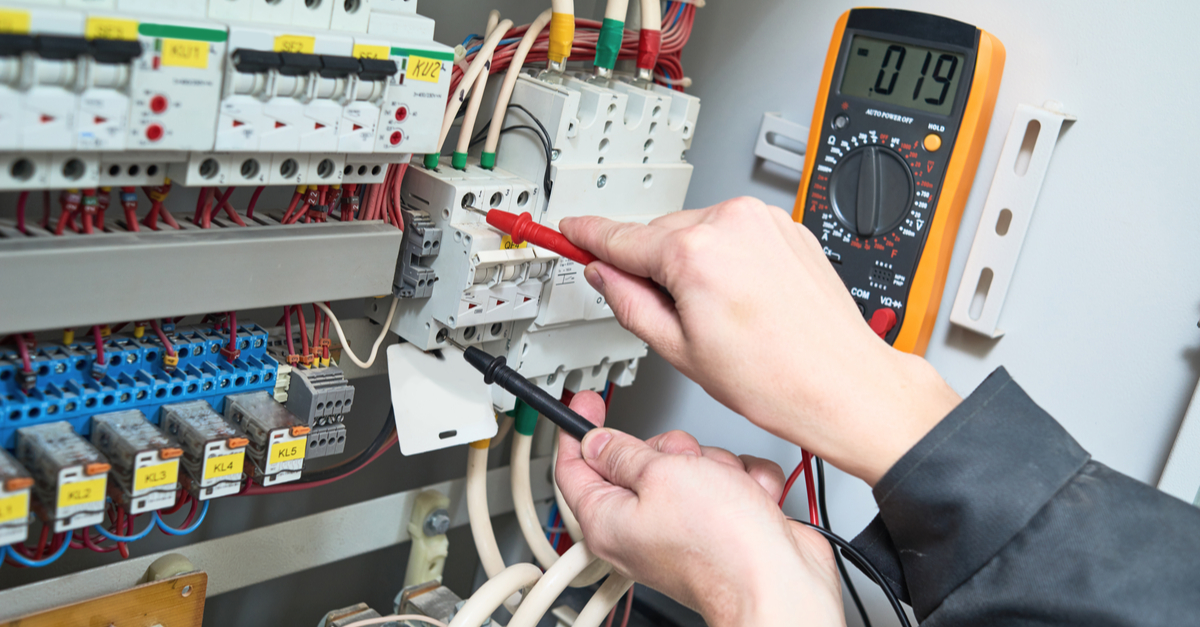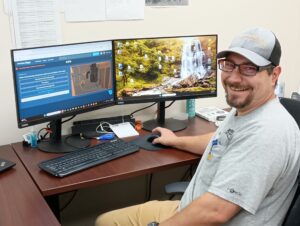There are two types of electrician apprentice jobs — union and non-union, with the main difference being the pace to a journeyman role. International Brotherhood of Electrical Workers (IBEW) apprenticeships, or union apprenticeships, will take you five years. Non-union apprenticeship can take significantly less time, though it may require more out-of-pocket expenses.
Union Apprenticeship
A union apprenticeship starts with taking a placement test. After passing, you are accepted into the IBEW. You will then be enrolled in entry-level safety and fundamentals of electricity classes through the IBEW, while also working in the field as an apprentice for various union contractors assigned to you by your union rep.
After you complete all your classroom electrical courses and finish your five years of service to the IBEW, you will need to take and pass both your state journeyman test and your union journeyman test.
Non-Union Apprenticeship
A non-union electrician apprenticeship can be obtained in several different ways, but all of them will require the completion of formal electrical courses, with the quickest being 10 months. These include electrical trainee programs offered by both community colleges and many postsecondary institutions across the country. Most programs provide job placement assistance to their graduates.
Before a non-union electrician apprentice can be eligible for the journeyman test, they must work in the field for four years or 8000 hours. During these four years, they will work for non-union contractors and will need to ensure they are registered as an electrician apprentice if the municipality requires it.
Types of Apprenticeship
In the electrical industry, there are several different apprenticeship types. They can be broken down into specialty fields such as:
- Industrial
- Motor control
- Commercial and high-rise construction
- Single-family residential
- Multi-family residential
- Fire alarm
- Low voltage and communications
Apprenticeships of these varieties will include similar basic concepts of electricity in their curriculum. After covering the basics, the curriculum will move to more complex and in-depth subjects more specific to a niche. The work you do in the field (ideally) should coincide with what you are learning in your apprenticeship classes.
Two things will be required for any electrician apprenticeship:
- You must have complete knowledge and understanding of both the NFPA 70 NEC and the NFPA 70 E
- You must be able to apply that knowledge practically in all the work that you do
Applying
Once you have researched your options and have decided on the apprenticeship that fits you, it is time to apply.
If you choose the non-union route, you will need to sign up for private formal classes. Sometimes, employers enroll you in them directly. If you choose to work while you are attending school, you will need to look for contractors hiring entry-level apprentices. To make yourself more attractive while applying, there are a few things to remember.
- Keep an organized set of application documents– When starting the application process always have a resume, a cover letter and references prepared.
- Your resume should be up to date and highlight your strengths and key skills in the field, preferably those that are applicable to the position in which you are applying.
- Get a letter– If you have no work experience, a letter of recommendation or reference from your electrical instructor will go a long way.
- It is OK to brag– Now is not the time to be humble. Make sure the employer knows your core competencies.
The Interview Process
Once you are selected for an interview, you want to ensure you are prepared.
- Dress professionally
- Come in with extra copies of your resume and references
- Give a firm handshake
- Be confident in your skills
- Be on time
Research the Company
It is important to show interest in the company. This is easily accomplished by doing a little bit of research about them before your interview. Look into their background. Where did it start? What are their specialties? This is also a good time to form questions you have about the position and the company.
Practice
Be prepared to answer questions concerning work ethic, safety precautions and electrical processes. If you’re asked something you don’t know, be honest and express that you are eager to learn.
Best Practices
Preparation is the key to getting the job that you want. Invest yourself into the process. Professionalism is the most obvious and easiest way to distinguish yourself.
- Punctuality is a symbol of preparation and professionalism. Arrive early and be available to stay later than scheduled to adapt to your interviewer’s busy schedule.
- Use LinkedIn or other professional networking options to engage with current employees you may interview with or former employees. This will go a long way, as it is common for hiring decisions to be made based on familiarity and comfortability with candidates.
- Try to relate to your interviewer. Use concise language and limit your slang.
Even if you don’t ‘nail’ the interview, your preparation for it will be appreciated and noted. Additionally, don’t be afraid to ask about learning opportunities beyond the apprenticeship. Your desire to expand your knowledge can only reflect positively on your candidacy.
Interplay Learning’s Interplay Learning offers beginner electrical courses, completely online, that can help you prepare for the interview process. Within just one course, you’ll be armed with the electrical knowledge you need to land any electrician apprentice job.

Chad Soucy
Interplay Learning Electrical Expert
Chad is Interplay’s electrical expert and is a Master Electrician. Chad has progressed as an electrical professional throughout his career, with early beginnings in rewiring/wiring homes to QA/Commissioning plants, honing his skills in all aspects of the electrical trade along the way. He transitioned his career through Residential, Commercial and Industrial sites, and in 2012, further expanded on his mission to lifelong learning in becoming an electrical instructor. He continued on this path as an online course developer and is steadfastly committed to electrical safety and sound adult learning theories.




